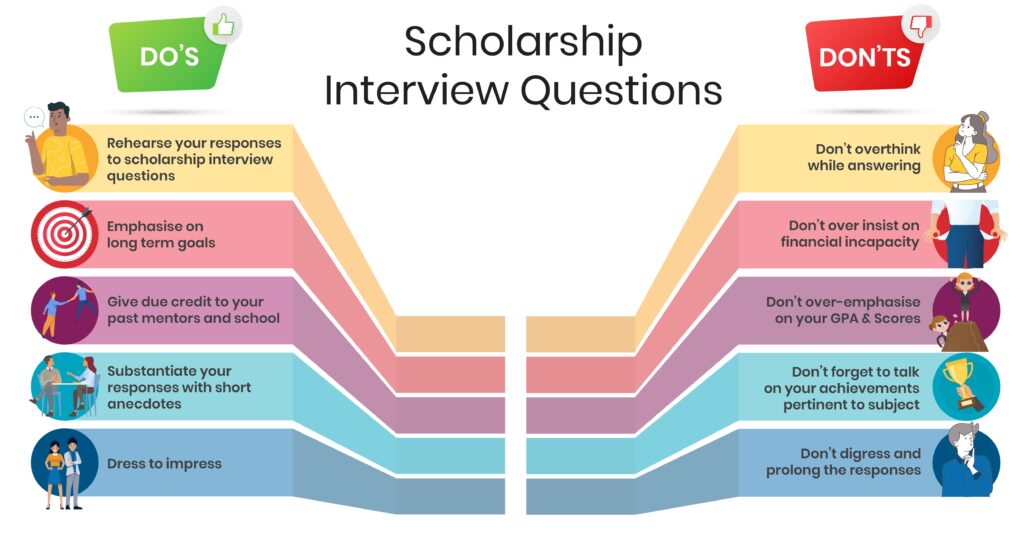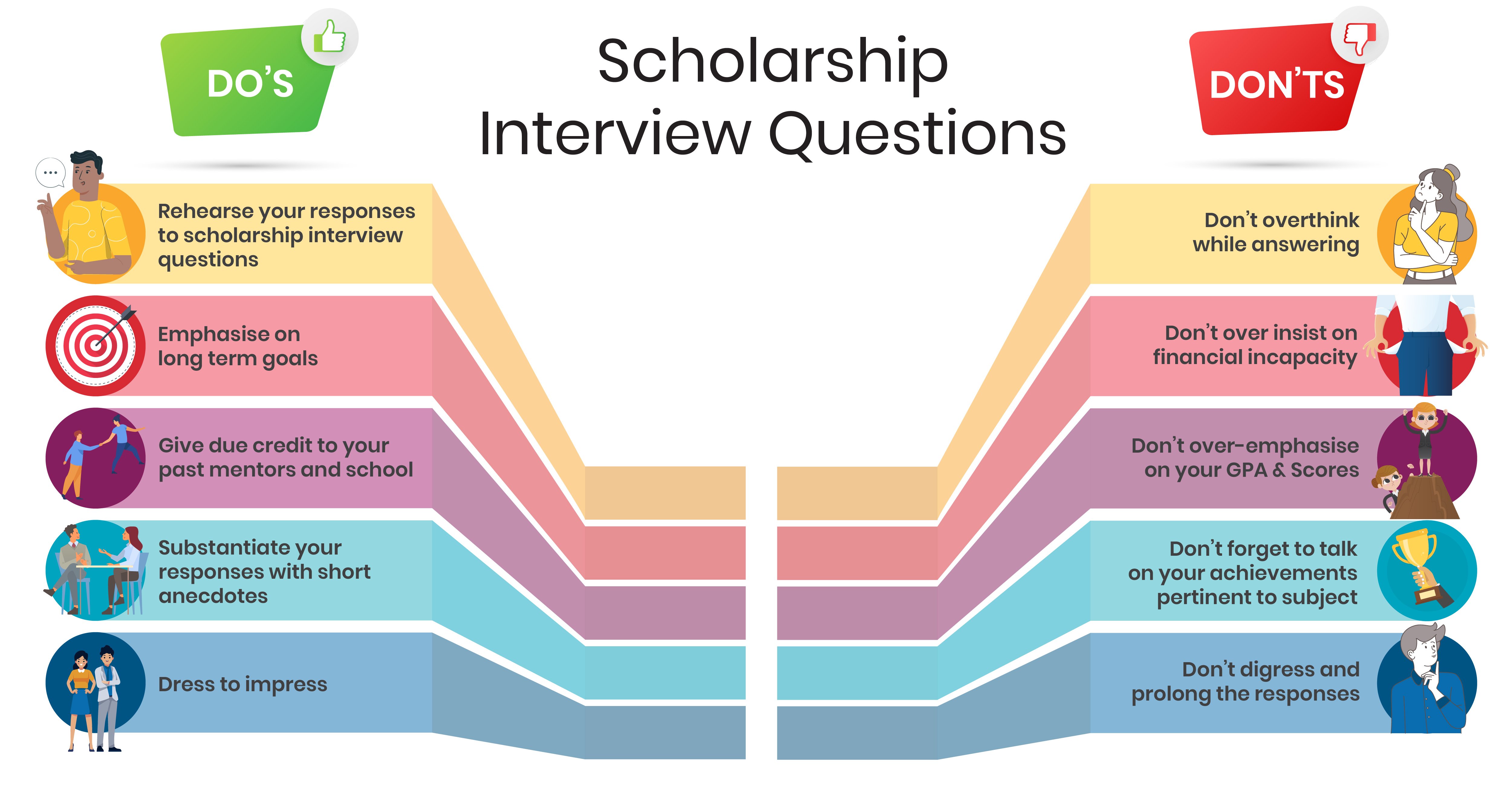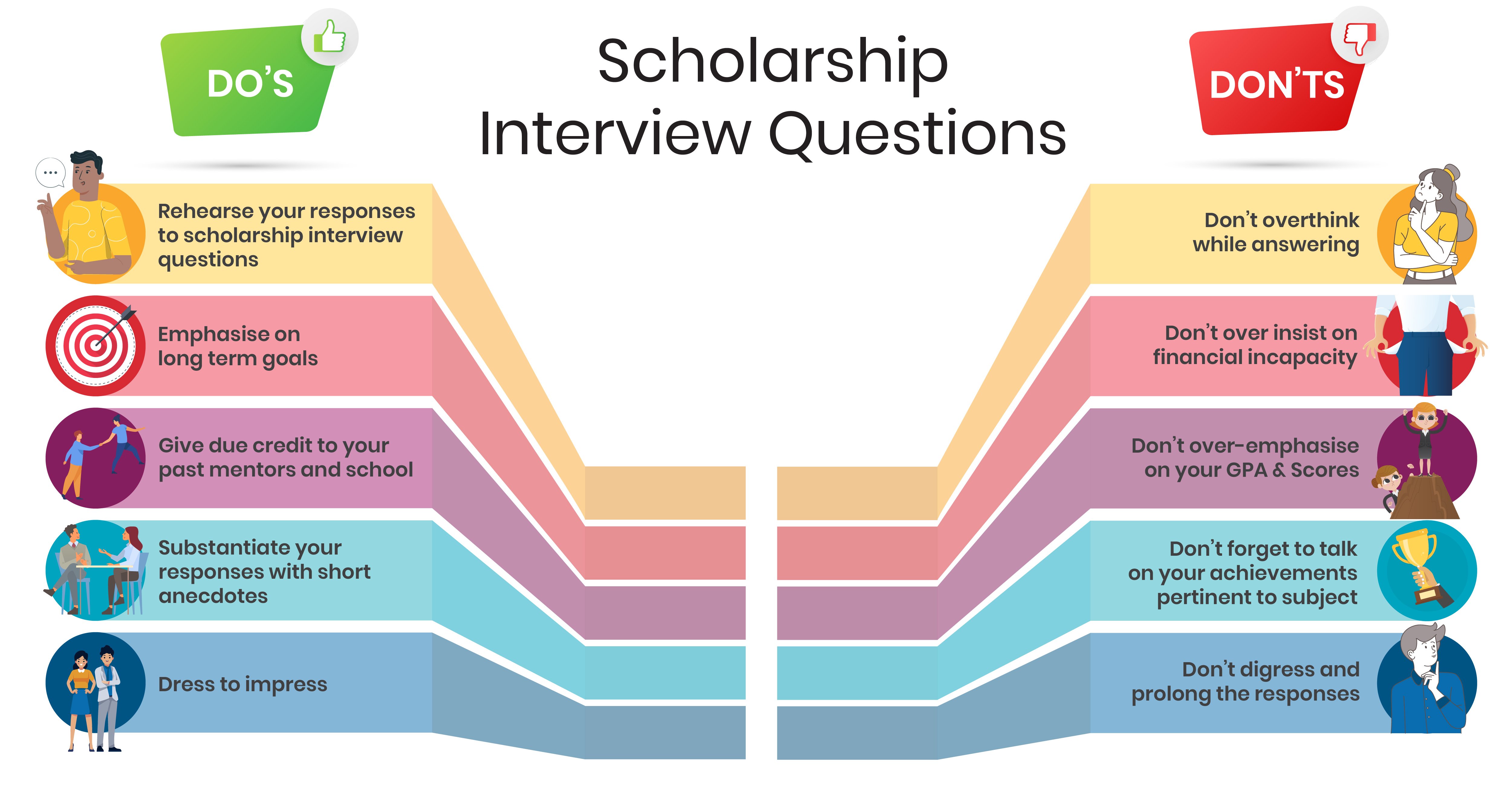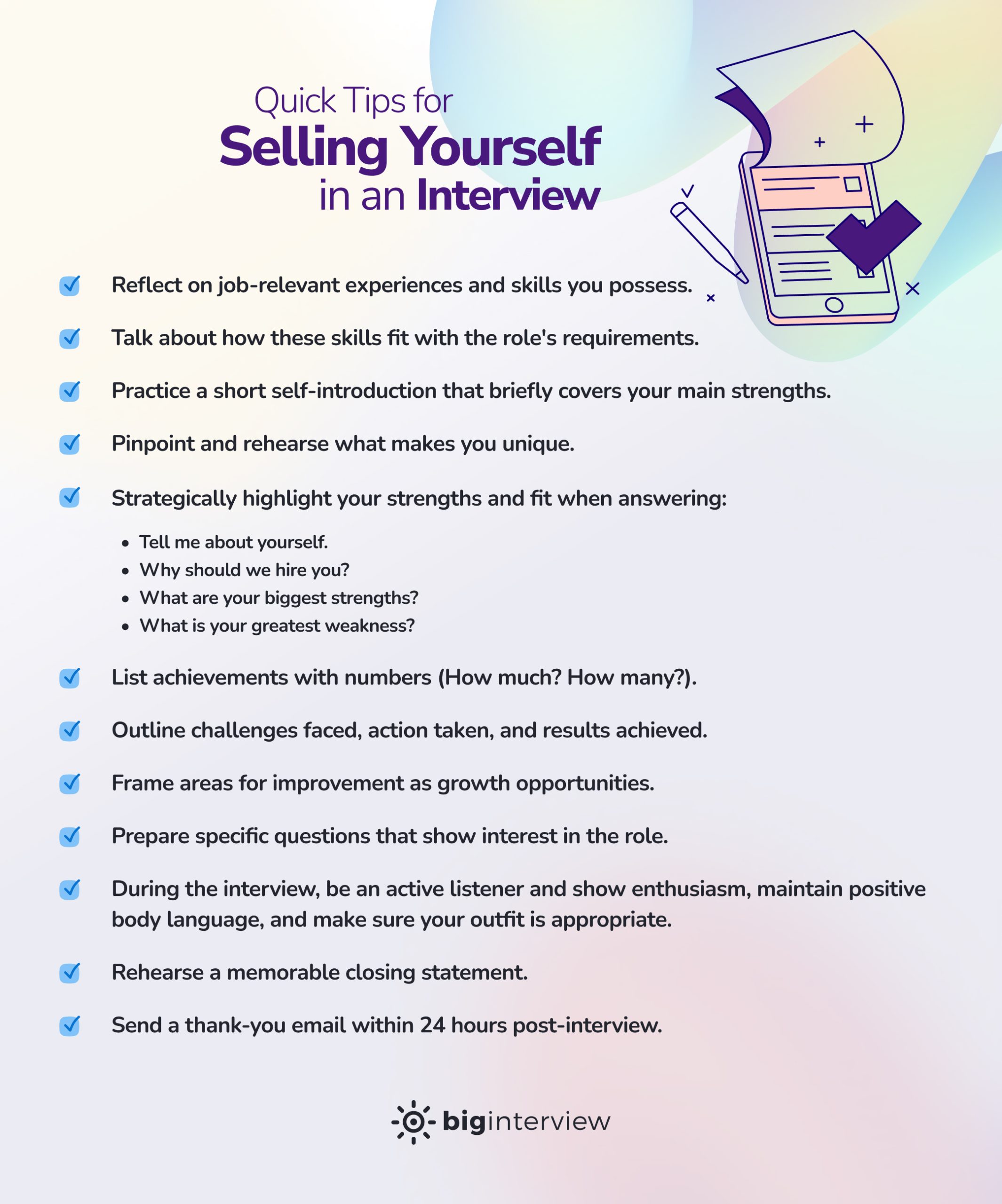How to Prepare for Scholarship Interviews

Landing a scholarship interview is a significant achievement, signaling that your application stood out from the crowd. However, the interview is the final hurdle standing between you and crucial financial aid. Preparation is key to showcasing your best self and convincing the selection committee that you are the ideal candidate. This article provides practical strategies and essential tips to help you navigate the scholarship interview process with confidence. We'll delve into researching the scholarship, practicing common interview questions, understanding appropriate etiquette, and highlighting your unique strengths to maximize your chances of success.
How to Ace Your Scholarship Interview: A Comprehensive Guide
Securing a scholarship often hinges on a successful interview. It's your chance to shine, showcase your personality, and convince the committee that you are the right candidate. Proper preparation is crucial. Don't just wing it; dedicate time to understanding common interview questions, practicing your answers, and researching the scholarship organization. By adequately preparing, you can significantly increase your chances of winning the scholarship. This guide will help you navigate the process and confidently present your best self.
Research the Scholarship and Organization
Before stepping into the interview room (or logging onto the virtual meeting), thoroughly research the scholarship and the organization offering it. Understand their mission statement, values, and history. Familiarize yourself with the eligibility criteria and the goals of the scholarship. This knowledge will allow you to tailor your responses to align with their objectives and demonstrate your genuine interest in their cause. For instance, if the scholarship emphasizes community involvement, be ready to articulate your past volunteer experiences and your future aspirations in that area.
Practice Answering Common Interview Questions
Many scholarship interview questions are predictable. Anticipate questions about your academic achievements, career aspirations, leadership skills, extracurricular activities, and financial need. Prepare thoughtful and well-structured answers that highlight your strengths and demonstrate your suitability for the scholarship. Practice your answers aloud to refine your delivery and build confidence. Don't memorize scripts; instead, focus on understanding the key points you want to convey and expressing them naturally. Consider utilizing the STAR method (Situation, Task, Action, Result) to structure your answers, providing specific examples to illustrate your experiences and accomplishments.
Prepare Thoughtful Questions to Ask
The interview is not just about the committee evaluating you; it's also an opportunity for you to learn more about the scholarship and the organization. Preparing thoughtful questions demonstrates your engagement and genuine interest. Ask questions that go beyond information readily available on their website. For example, you could inquire about the scholarship's impact on past recipients, the organization's future initiatives, or opportunities for networking and mentorship. Avoid asking questions about information that is easily found on their website or about the scholarship's monetary value, as these can come across as unprepared or self-serving.
Dress Professionally and Be Punctual
First impressions matter. Dress professionally for the interview, even if it's virtual. Choose attire that is conservative and appropriate for a formal setting. Pay attention to details such as grooming and hygiene. Arrive on time, whether in person or online. If it's a virtual interview, test your technology beforehand to ensure your camera, microphone, and internet connection are working properly. Being punctual and well-presented demonstrates your respect for the committee's time and your commitment to the scholarship opportunity.
Follow Up After the Interview
After the interview, send a thank-you note to the committee members. Express your gratitude for their time and reiterate your interest in the scholarship. Briefly mention something specific you discussed during the interview to personalize the note. This simple gesture demonstrates your professionalism and reinforces your positive impression. A handwritten note is ideal, but an email is also acceptable, especially if the interview was conducted virtually or if time is of the essence. Sending a thank-you note is a courteous way to show your appreciation and leave a lasting impression.
| Key Preparation Area | Specific Actions | Why It Matters |
|---|---|---|
| Scholarship Research | Review mission statement, values, and past recipients. | Demonstrates genuine interest and alignment with the organization's goals. |
| Question Preparation | Anticipate common questions and practice responses using the STAR method. | Ensures confident and articulate delivery of your strengths and qualifications. |
| Thoughtful Inquiries | Prepare relevant questions about the scholarship's impact and organization's initiatives. | Shows engagement and desire to learn more beyond superficial information. |
| Professional Presentation | Dress appropriately, arrive on time (or test technology), and maintain good hygiene. | Creates a positive first impression and demonstrates respect for the committee. |
| Post-Interview Follow-Up | Send a thank-you note expressing gratitude and reiterating interest. | Reinforces your positive impression and shows professionalism and courtesy. |
How do you stand out in a scholarship interview?

Show Genuine Enthusiasm and Passion
- Demonstrate a deep understanding of the scholarship's mission and values. Research the organization and understand its goals.
- Express your genuine excitement about the opportunity and how it aligns with your personal and professional aspirations. Your passion should be palpable.
- Share specific examples of how you've pursued your interests and how the scholarship would enable you to further explore them. Avoid generic statements.
Highlight Unique Experiences and Skills
- Identify your unique skills and experiences that differentiate you from other candidates. This could be anything from volunteer work to creative projects.
- Articulate how these experiences have shaped your perspective and contributed to your personal growth. Show how these experiences have made you a better candidate.
- Quantify your achievements whenever possible to demonstrate the impact you've made in previous roles or projects. Use numbers to back up your claims.
Connect Your Goals to the Scholarship
- Clearly articulate your long-term goals and how the scholarship will help you achieve them. Make a direct connection between the funding and your aspirations.
- Explain how you plan to contribute to your field and the broader community after completing your studies. Think about your impact beyond graduation.
- Show that you have a realistic plan for utilizing the scholarship funds effectively. Be specific about how you will use the money.
Engage with the Interviewers and Ask Thoughtful Questions
- Actively listen to the interviewers and respond thoughtfully to their questions. Demonstrate that you're engaged in the conversation.
- Prepare insightful questions to ask the interviewers about the scholarship program and the organization. Show your curiosity and interest.
- Make eye contact and maintain a positive and respectful demeanor throughout the interview. First impressions matter.
Practice and Prepare Thoroughly
- Practice answering common interview questions aloud to build confidence and fluency. Rehearse your responses until they feel natural.
- Research the interviewers' backgrounds to gain insights into their interests and perspectives. Knowing their expertise can help you tailor your answers.
- Prepare a professional and polished appearance. Ensure your attire is appropriate for the interview setting.
How do I ace my scholarship interview?

Research the Scholarship Provider
Before the interview, thoroughly research the organization or foundation providing the scholarship. Understand their mission, values, and the types of students they typically support. Knowing this will allow you to tailor your answers to align with their goals and demonstrate that you've taken the time to understand their perspective.
- Visit their website and social media pages.
- Read about past scholarship recipients.
- Identify key people involved in the organization.
Practice Common Interview Questions
Prepare for common interview questions that are likely to come up. These include questions about your academic achievements, extracurricular activities, career goals, and why you need the scholarship. Practice your answers out loud so you can articulate them clearly and confidently. Be prepared to provide specific examples and anecdotes to support your claims.
- "Tell me about yourself."
- "Why do you deserve this scholarship?"
- "What are your academic/career goals?"
- "What are your strengths and weaknesses?"
- "How will this scholarship help you?"
Showcase Your Personality and Passion
The interview panel wants to get to know you as a person, not just a list of accomplishments. Let your personality shine through and demonstrate your passion for your field of study. Be enthusiastic and genuine in your responses, and don't be afraid to share your personal story and unique perspective.
- Share anecdotes that highlight your character and values.
- Talk about your interests and hobbies outside of academics.
- Show genuine enthusiasm for the scholarship opportunity.
Dress Professionally and Maintain Good Body Language
First impressions matter. Dress professionally for the interview, even if it's conducted virtually. This shows that you take the opportunity seriously. Maintain good body language throughout the interview, such as making eye contact, sitting up straight, and smiling. Project confidence and enthusiasm through your non-verbal communication.
- Choose appropriate attire (business casual or formal).
- Maintain eye contact with the interviewer(s).
- Avoid fidgeting or distracting gestures.
Prepare Thoughtful Questions to Ask
At the end of the interview, you'll likely be given the opportunity to ask questions. Prepare a few thoughtful questions to ask the interviewer. This shows that you're engaged and interested in learning more about the scholarship and the organization. Avoid asking questions that can easily be answered by researching their website.
- "What qualities do you look for in a scholarship recipient?"
- "What impact has this scholarship had on past recipients?"
- "What opportunities are available to scholarship recipients?"
What questions are asked at a scholarship interview?

Why This Scholarship?
Interviewers often delve into your understanding of the specific scholarship and why it appeals to you. This goes beyond needing financial aid. They want to know if you align with the scholarship's mission and goals. The best approach to show that you align with the scholarship's mission and goals is by providing specific, and insightful reasons for your interest, demonstrating thorough research. Prepare to articulate your rationale and illustrate how the scholarship would be instrumental in your academic and personal journey. You should include elements such as:
- Demonstrate Knowledge: Show that you've researched the scholarship provider's mission, values, and history.
- Articulate Alignment: Explain how your goals and aspirations align with the scholarship's purpose.
- Highlight Impact: Describe how receiving the scholarship will enable you to contribute to the organization's goals or your field of study.
Your Academic and Career Aspirations
A significant portion of the interview will be dedicated to exploring your academic history, current studies, and future career goals. The intention is to assess your commitment to your chosen field and your vision for the future. Be able to discuss your major in detail, including your favorite courses and professors. Have a clear and concise statement of your career goals, demonstrating a realistic understanding of the path you've chosen. You can answer it by following these steps:
- Academic Achievements: Discuss your academic record, focusing on achievements and areas where you excel.
- Future Goals: Clearly articulate your career aspirations and how your education will help you achieve them.
- Motivation and Drive: Convey your passion for your field of study and your determination to succeed.
Your Extracurricular Activities and Leadership Roles
Scholarship committees value well-rounded individuals who are actively involved in their communities. They will likely inquire about your extracurricular activities, volunteer work, and leadership experiences. Prepare to discuss the specific activities in which you've participated, and provide concrete examples of your contributions and achievements. Be prepared to demonstrate your leadership abilities by sharing instances where you took initiative, motivated others, or successfully managed a project or team. Also, include:
- Activity Highlights: Describe your involvement in extracurricular activities and the skills you've developed.
- Leadership Experience: Share examples of leadership roles you've held and the impact you've made.
- Community Involvement: Discuss your volunteer work or community service experiences and what you've learned from them.
Challenges and How You Overcame Them
Interviewers are interested in your resilience and ability to learn from setbacks. They may ask about challenges you've faced and how you overcame them. Choose a specific and relevant challenge that you encountered, such as an academic difficulty, a personal obstacle, or a professional setback. Clearly articulate the steps you took to address the challenge, the resources you utilized, and the support you sought. Be honest about the mistakes you made along the way, and focus on the lessons you learned and how they contributed to your personal growth and development. Show that you've learned from past experiences and have the ability to adapt and grow as a result. Here are more tips to answer:
- Choose Wisely: Select a challenge that demonstrates resilience and problem-solving skills.
- Highlight Growth: Emphasize what you learned from the experience and how it shaped you.
- Focus on Positives: Frame the challenge as an opportunity for growth and self-improvement.
Questions for the Interviewer
Most interviews conclude with an opportunity for you to ask questions. This is your chance to show your genuine interest in the scholarship and the organization providing it. Prepare thoughtful questions that demonstrate your curiosity and engagement. Asking questions also show the interviewer that you are also invested, that you care about the scholarship program, and about the organization. To make the best of the opportunity, include some of these questions in the interview:
- Show Interest: Ask questions that demonstrate your genuine interest in the scholarship program and the organization.
- Clarify Doubts: Use this opportunity to clarify any doubts or seek additional information about the scholarship.
- Leave a Lasting Impression: End the interview on a positive note by expressing your gratitude and enthusiasm.
How do I sell myself in a scholarship interview?

Demonstrate Your Passion and Alignment
- Research the scholarship provider thoroughly. Understand their mission, values, and the types of students they typically support. Tailor your responses to demonstrate how your goals and aspirations align with their objectives.
- Articulate your passion for your field of study. Explain what excites you about your chosen academic path and how the scholarship will enable you to make a significant contribution to the field.
- Showcase your commitment to making a difference. Highlight any volunteer work, community involvement, or extracurricular activities that demonstrate your dedication to serving others and making a positive impact.
Highlight Your Academic Achievements and Potential
- Prepare specific examples of your academic success. Mention any honors, awards, or high grades you have received, and explain the challenges you overcame to achieve them.
- Discuss your academic goals and how the scholarship will help you achieve them. Be specific about your future plans and how the scholarship will enable you to pursue advanced studies, conduct research, or gain valuable experience.
- Emphasize your intellectual curiosity and eagerness to learn. Demonstrate that you are a lifelong learner who is always seeking new knowledge and challenges.
Showcase Your Leadership and Extracurricular Involvement
- Provide specific examples of your leadership skills. Describe any leadership roles you have held in clubs, organizations, or teams, and explain how you effectively motivated and guided others.
- Highlight your involvement in extracurricular activities. Discuss your participation in sports, arts, music, or other activities that demonstrate your well-roundedness and commitment.
- Explain what you learned from these experiences and how they have helped you grow as a person. Focus on the skills and qualities you have developed, such as teamwork, communication, and problem-solving.
Communicate Your Financial Need and Responsibility
- Clearly and concisely explain your financial situation. Be honest and transparent about your financial needs and how the scholarship will alleviate the burden of tuition and other expenses.
- Demonstrate your financial responsibility and commitment to managing your resources wisely. Discuss any steps you have taken to save money, seek part-time employment, or reduce your expenses.
- Express your gratitude for the scholarship opportunity and your commitment to making the most of it. Let the interviewers know that you appreciate their support and that you will use the scholarship to achieve your full potential.
Practice and Present Yourself Confidently
- Practice answering common scholarship interview questions. Prepare thoughtful and well-articulated responses to questions about your strengths, weaknesses, goals, and aspirations.
- Dress professionally and maintain good eye contact. Make a positive first impression by dressing appropriately and demonstrating confidence in your appearance.
- Speak clearly and enthusiastically, and be yourself. Let your personality shine through and be genuine in your responses. Show the interviewers that you are not only a deserving candidate, but also a likable and engaging individual.
Frequently asked questions
What kind of research should I conduct before my scholarship interview?
Before your scholarship interview, you should conduct thorough research on the organization offering the scholarship, its mission, and its values. You should also research the scholarship itself, understanding its goals and criteria. Finally, research the interviewers, if possible, to understand their backgrounds and interests. This preparation will allow you to tailor your responses and demonstrate your genuine interest.
How can I prepare for common scholarship interview questions?
To prepare for common scholarship interview questions, practice answering them out loud. Anticipate questions about your academic achievements, extracurricular activities, future goals, and reasons for needing the scholarship. Prepare specific examples that highlight your skills and demonstrate your personality. Record yourself practicing and review the footage to identify areas for improvement in your delivery and content.
What should I wear to a scholarship interview?
Your attire for a scholarship interview should be professional and conservative. Aim for business casual or business formal attire. For example, consider a suit or dress pants with a button-down shirt or blouse. Ensure your clothing is clean, well-fitting, and wrinkle-free. Avoid distracting accessories or revealing clothing. Your goal is to present yourself as a serious and respectful candidate.
How can I make a lasting positive impression during the interview?
To make a lasting positive impression, be enthusiastic, confident, and genuine. Maintain eye contact, smile, and speak clearly. Listen attentively to the interviewer's questions and provide thoughtful responses. Ask insightful questions at the end of the interview to show your interest and engagement. Most importantly, be yourself and let your passion and personality shine through. Remember to send a thank-you note after the interview to reinforce your appreciation.
